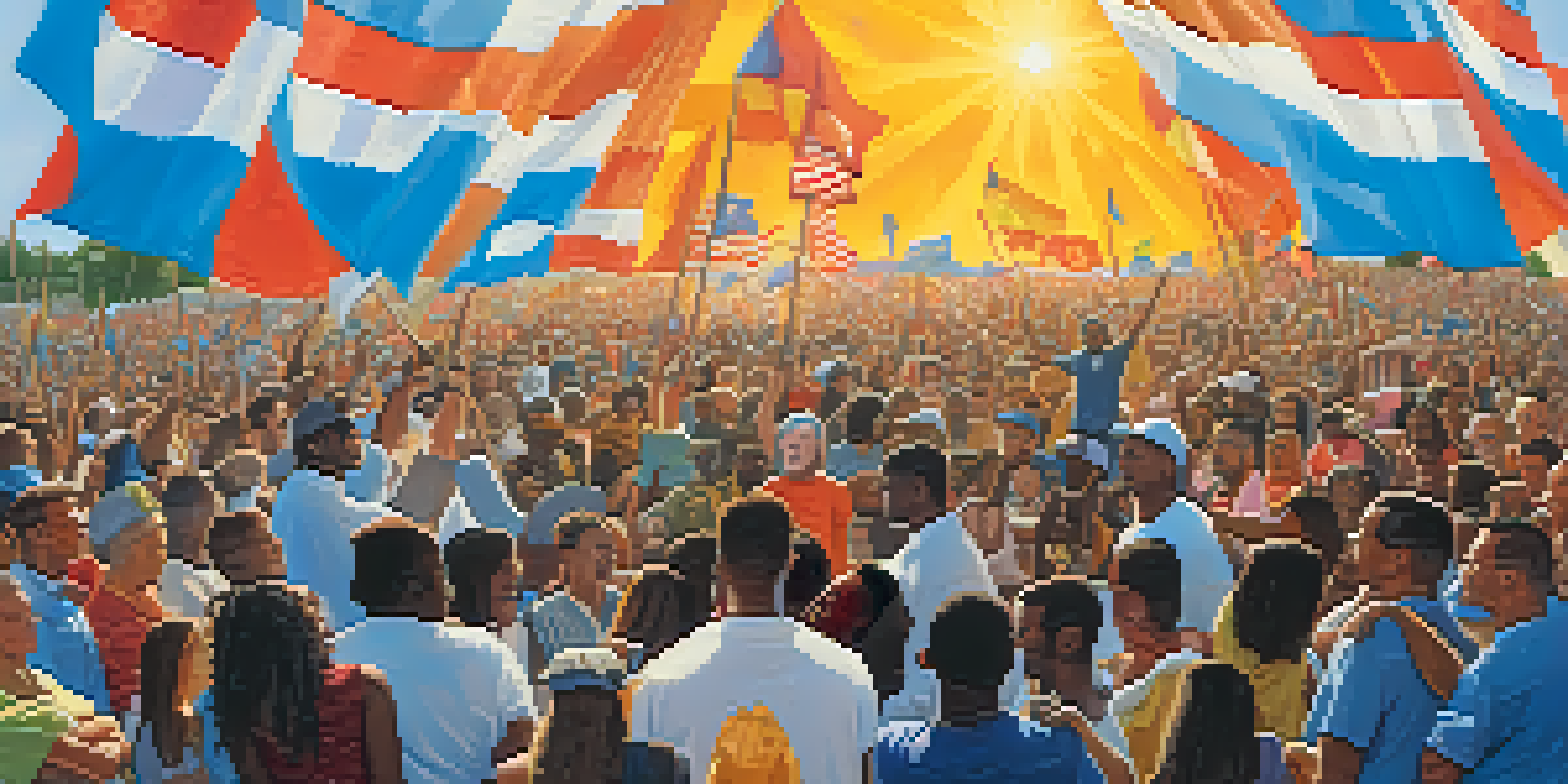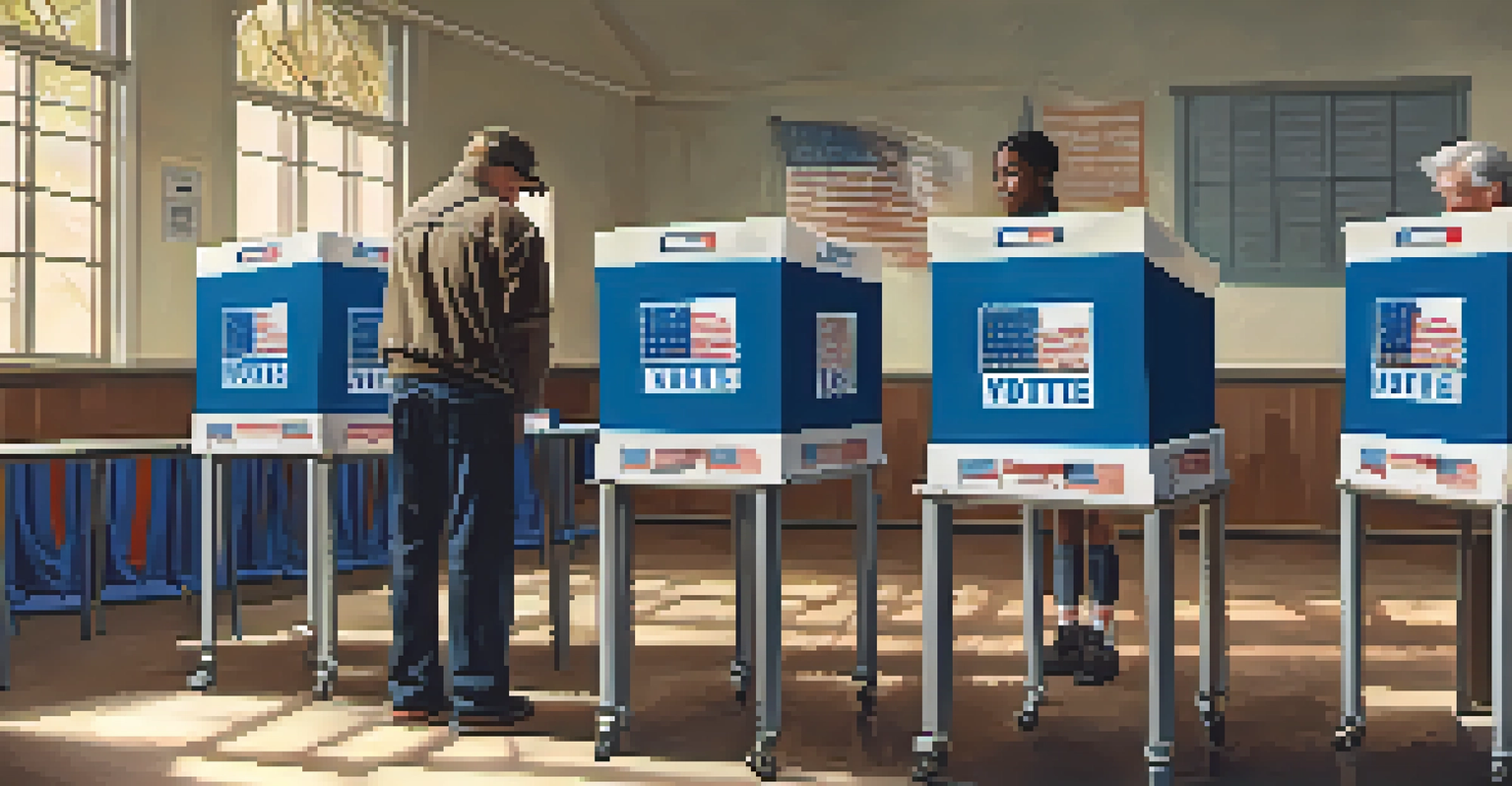Understanding the Influence of Political Parties in NC

The Historical Context of Political Parties in NC
North Carolina has a rich political history that has shaped its party dynamics. From the early days of the Democratic Party's dominance to the emergence of the Republican Party, the political landscape has evolved significantly. Understanding this history gives insight into why certain parties have strongholds in specific regions.
Political parties are essential to the functioning of our democracy, providing a framework for political debate and representation.
For instance, the post-Civil War era saw the Democratic Party regain power, impacting state policies for decades. It wasn’t until the late 20th century that the Republican Party began to gain traction, particularly in suburban areas. This historical evolution is essential for understanding current party affiliations and voter behaviors.
Moreover, key events, such as the Civil Rights Movement, played crucial roles in reshaping party ideologies and alignments. These historical elements continue to influence party strategies and voter outreach today, making the state a fascinating case study in American politics.
Major Political Parties: Democrats and Republicans
In North Carolina, the Democratic and Republican parties are the two dominant forces in the political arena. The Democratic Party traditionally focuses on issues such as social justice, healthcare, and education, appealing to a diverse voter base. Meanwhile, the Republican Party tends to emphasize fiscal conservatism, individual liberties, and economic growth, resonating with many rural voters.

The competition between these parties often shapes legislative agendas and electoral strategies. For example, Democrats might advocate for expanded Medicaid access, while Republicans may prioritize tax cuts. This tug-of-war influences how policies are crafted and implemented, impacting the daily lives of North Carolinians.
NC Political Parties' Rich History
North Carolina's political landscape has evolved significantly over time, shaped by historical events and party dynamics.
Additionally, each party's approach to critical issues, like climate change and education reform, reflects their core values and the demographics of their supporters. As the state continues to grow and diversify, both parties must adapt to meet the changing needs of their constituents.
The Role of Third Parties in North Carolina Politics
While the Democratic and Republican parties dominate, third parties also play a role in shaping political discourse in North Carolina. Parties like the Libertarian Party and the Green Party introduce alternative viewpoints on issues ranging from personal freedom to environmental sustainability. Their presence can encourage larger parties to address concerns that might otherwise be overlooked.
In a democracy, political parties are the mechanisms through which the people voice their concerns and aspirations.
In recent elections, third-party candidates have influenced outcomes by drawing votes away from major party candidates. For instance, a strong Libertarian candidate can siphon off conservative votes, potentially changing the race's dynamics. This impact demonstrates that while they may not win, third parties can still be significant players.
Moreover, third parties often bring innovative ideas to the table, challenging the status quo and promoting a broader range of political discussions. Their participation can lead to more inclusive policies and encourage voters to think critically about their choices at the ballot box.
Voter Demographics and Political Party Influence
Understanding voter demographics is crucial for grasping the influence of political parties in North Carolina. Factors such as age, race, and education level significantly impact party affiliation and voting behavior. For example, younger voters tend to lean more Democratic, while older populations often support Republican candidates.
Additionally, North Carolina's growing diversity adds complexity to the political landscape. The influx of Latino and African American voters has shifted the dynamics in various regions, particularly urban areas like Charlotte and Raleigh. This demographic evolution forces both major parties to reconsider their platforms and outreach strategies.
Impact of Voter Demographics
The diverse demographics in North Carolina heavily influence party affiliation and voting behavior, requiring parties to adapt their strategies.
As parties strive to connect with these diverse voter bases, they often tailor their messages and policies to resonate with different groups. This adaptability is essential for maintaining relevance in a rapidly changing political climate, highlighting the importance of understanding voter demographics.
The Influence of Local Politics and Elections
Local elections in North Carolina often serve as a microcosm of broader political trends, showcasing the influence of political parties at the grassroots level. City councils, school boards, and county commissions all play critical roles in shaping community policies and priorities. The outcomes of these elections can reflect the sentiments of local voters and signal shifts in party influence.
For instance, a Democratic victory in a local mayoral race might indicate a growing trend towards progressive policies in that area. Conversely, a Republican win could suggest a preference for traditional values and fiscal conservatism. Monitoring these local elections allows observers to gauge the pulse of the electorate and predict future trends.
Furthermore, local elections can often serve as a testing ground for state and national party strategies. The issues that resonate in local races can inform how parties approach larger elections, influencing campaign tactics and policy proposals at higher levels.
Campaign Strategies and Political Advertising
In today's digital age, campaign strategies and political advertising have become more sophisticated and targeted. Political parties in North Carolina utilize social media, data analytics, and traditional advertising to reach voters effectively. The ability to tailor messages to specific demographics can make a significant difference in election outcomes.
For example, targeted Facebook ads may focus on issues like student loan forgiveness to engage younger voters, while mailers might highlight tax cuts for older residents. This strategic approach allows parties to connect with voters on an individual level, increasing engagement and turnout.
Third Parties' Role in Elections
While dominated by Democrats and Republicans, third parties in North Carolina introduce alternative viewpoints and can influence major party outcomes.
Moreover, negative advertising has become a common tactic in political campaigns, often leading to increased polarization. While these strategies can effectively sway opinions, they also raise questions about the overall health of political discourse in the state.
Looking Ahead: The Future of Political Parties in NC
As North Carolina continues to evolve, the future of its political parties remains uncertain. Factors such as shifting demographics, changing voter priorities, and the influence of technology will play significant roles in shaping party strategies. Both major parties will need to adapt to maintain their relevance and appeal to an increasingly diverse electorate.
Moreover, the rise of independent voters presents both challenges and opportunities for political parties. As more people identify as independents, parties must work harder to engage these voters and earn their trust. This shift could lead to changes in party platforms and a reevaluation of traditional party lines.

Ultimately, the landscape of political parties in North Carolina will continue to shift, reflecting the values and priorities of its citizens. Staying attuned to these changes will be crucial for understanding the future of politics in the state.